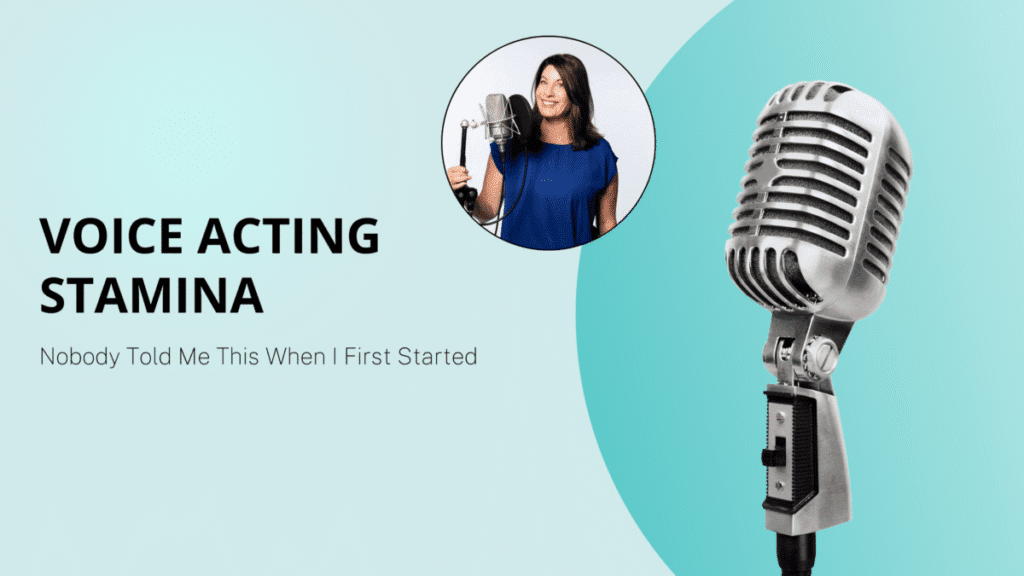
Advice I Wish I Had Before Starting in VO
When I first stepped into the world of voiceover, I already had years of experience as a session singer. I started doing studio work back in high school and then in music college in Los Angeles. That background gave me a head start in some ways, but it also opened my eyes to just how demanding this work can be.
I quickly realized that voiceover isn’t just about creativity or performance. It’s also about stamina. Learning to stay versatile and keep your energy up for long sessions was something I definitely learned the hard way.
I’ll never forget one of my first marathon recording days as a singer. I was 14 years old and playing the lead role, Penelope, on a children’s album called Toad. After hours in the booth, my voice was giving out, my brain felt foggy, and my body was stiff from standing too long.
That’s when it hit me: this is a physical job – not just a vocal one.
Whether it’s session singing or voice acting, you’ve got to treat it like an athletic performance if you want to deliver your best.
Voice Acting Takes Serious Stamina – Physically and Mentally
The truth is, voice acting isn’t just about sounding good behind the mic. It’s about endurance.
- Endurance to record take after take.
- Stamina to stay mentally sharp and emotionally connected.
- Resilience to keep going, even when you’re tired, sick, or uninspired.
And here’s what I wish someone had told me at the beginning:
Take care of your body, or your voice won’t be able to keep up.
The Basics of Building Voice Acting Stamina
As an online voice over coach, one of the first things I teach my students is this: Your body is your instrument. You wouldn’t expect a saxophonist to perform without tuning or warming up their horn, right?
Here are 3 foundational habits that will help you build the voice acting stamina you need for a sustainable career:
1. Warm Up Before Every Session
Don’t skip this part. Gentle neck rolls, lip trills, vocal sirens, and tongue twisters can go a long way in waking up your vocal cords and preventing strain.
Tip: Even a 5-minute warm-up routine can reduce vocal fatigue and improve delivery consistency.
2. Stay Hydrated
Water is essential for vocal health. Keep a full bottle near your booth and sip regularly, especially before and during sessions. You’ll see instantly how this will improve your voice acting stamina!
Tip: Avoid caffeine and alcohol right before recording. They’re dehydrating.
3. Rest Like a Professional
You can’t perform well if you’re running on empty. Voice over work is demanding, especially during busy seasons with back-to-back sessions or auditions.
Make time for:
-
Regular breaks between recordings
-
A full night’s sleep
-
Mindful movement like stretching, walking, or yoga
What Happens When You Push Too Hard?
Ever had to record when you’re sick?
I have! And let me tell you – voice acting when you’re under the weather is brutal. Your voice doesn’t respond the same way. Your energy dips. And the performance almost always suffers.
That’s why building voice acting stamina before you need it is so important. It’s not just about powering through. It’s about working smarter so you can deliver your best, every time.
A Final Word from Your Online Voice Over Coach
Whether you’re brand new to VO or you’ve been in the booth for a while, remember this:
Your voice is only as strong as the body and mind behind it.
Voice acting stamina doesn’t come overnight, but with the right habits, it will carry you through tough sessions, heavy audition weeks, and even those dreaded cold-and-congested days.
If you’re looking for more tips like this, I’ve got a free guide you’ll love:
Grab the VALUE Method Audition Guide
Learn how to prep and deliver standout auditions with more confidence, clarity, and energy without burning out. It’s like having an online voice over coach in your back pocket!
You’ve got this. Take care of your voice, take care of your body, and keep showing up.
Your future VO self will thank you.
And if you’re wanting to dive deeper into vocal health, my door is always open. New students get a free 15 minute call where we can identify your strengths, help you determine where your voice might fit in today’s voice over market, and answer any questions you might have. You can schedule that here.
